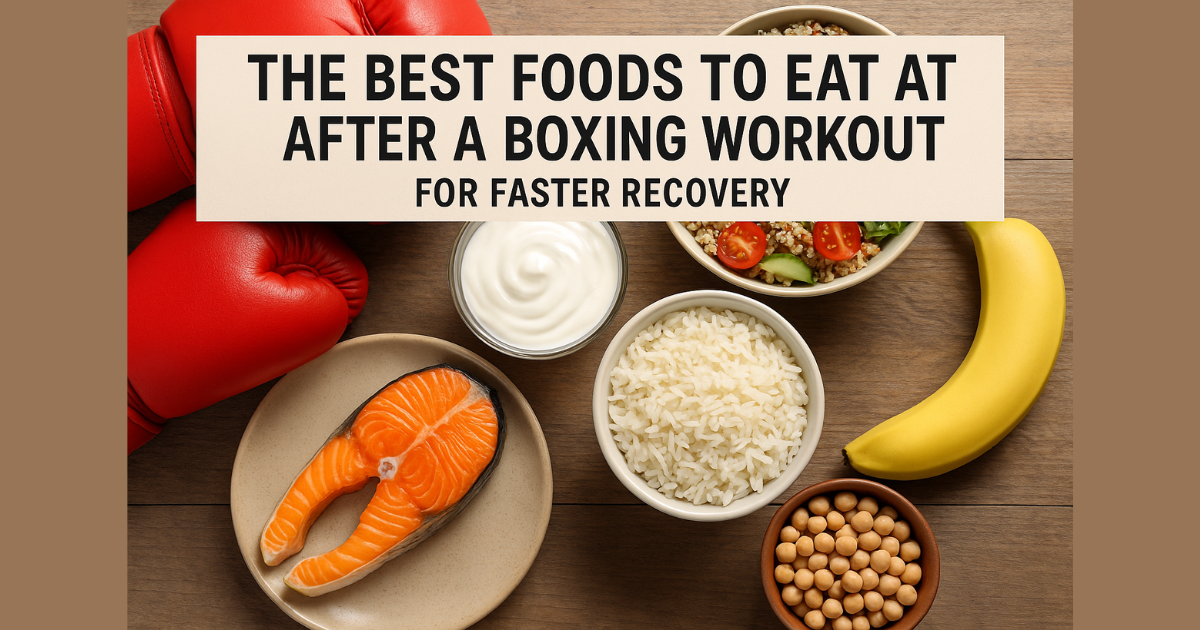Boxing is one of the most physically demanding sports in the world. A single training session can leave you drenched in sweat, depleted of energy, and with sore muscles that need proper fuel to bounce back. What you eat after your boxing workout can make or break your recovery, directly impacting how fast you heal, how much muscle you build, and how ready you are for the next session.
In this guide, we’ll explore the best foods to eat after a boxing workout for faster recovery, backed by science and practical advice.
Why Nutrition Matters After Boxing Training
The Science of Muscle Recovery
When you box, your muscles undergo microscopic tears. This isn’t a bad thing — it’s how you grow stronger. But those muscles need the right nutrients to repair and rebuild. Without proper nutrition, your body struggles to recover, leading to fatigue, soreness, and even injuries.
Role of Macronutrients: Protein, Carbs, and Fats
- Protein repairs and builds muscle fibers.
- Carbohydrates restore glycogen, your body’s fuel tank.
- Fats help reduce inflammation and support joint health.
A boxer who skips on any of these macronutrients risks slowing down recovery.
The Golden Window: When to Eat After a Boxing Workout
Immediate Post-Workout (0–30 Minutes)
The first 30 minutes after training is known as the anabolic window. During this time, your muscles are like sponges, absorbing nutrients quickly. A protein shake with a fast-digesting carb like banana is perfect here.
The 2-Hour Recovery Window
Even if you miss the first 30 minutes, you still have a 2-hour recovery window. A balanced meal with lean protein, complex carbs, and healthy fats will set the stage for faster healing.
Best Proteins for Boxing Recovery
Lean Meats: Chicken, Turkey, and Fish
These are high-quality protein sources that help repair muscle tissue quickly. Grilled chicken breast with rice and vegetables is a classic recovery meal.
Plant-Based Options: Tofu, Lentils, and Quinoa
For vegan or vegetarian boxers, plant-based proteins like tofu, chickpeas, and quinoa offer all the amino acids needed for recovery.
Protein Shakes and Smoothies
If you’re short on time, a whey protein or plant-based protein shake blended with fruits provides a quick, nutrient-dense option.
Carbohydrates for Energy Replenishment
Whole Grains: Brown Rice, Quinoa, Oats
Complex carbs provide sustained energy and refill glycogen stores. A bowl of oats with berries is a powerhouse recovery meal.
Fruits and Vegetables for Fast Absorption
Fruits like bananas, pineapples, and oranges provide quick energy and antioxidants that fight muscle inflammation.
Healthy Fats for Reduced Inflammation
Omega-3 Rich Foods: Salmon, Chia Seeds, Walnuts
These healthy fats reduce post-training inflammation, helping muscles heal faster.
Avocados and Olive Oil
Both provide monounsaturated fats that support heart and joint health, making them great additions to a recovery meal.
Hydration and Electrolyte Balance
Water vs. Sports Drinks
While water is essential, boxers who sweat heavily may benefit from electrolyte-packed drinks to replace lost sodium and potassium.
Coconut Water and Natural Electrolytes
A natural alternative to sports drinks, coconut water restores hydration while avoiding artificial sugars.
The Role of Micronutrients in Recovery
Vitamins for Energy & Healing
- Vitamin C boosts collagen production for tissue repair.
- Vitamin D supports muscle strength and recovery.
Minerals That Aid Muscle Repair
- Magnesium eases cramps and supports relaxation.
- Zinc plays a role in protein synthesis and healing.
Post-Boxing Meal Ideas for Faster Recovery
Quick Meals (Shakes, Smoothies, Wraps)
- Protein shake + banana + peanut butter.
- Turkey wrap with avocado and spinach.
- Greek yogurt with granola and honey.
Balanced Full Meals (Rice Bowls, Grilled Protein + Veggies)
- Grilled salmon with quinoa and broccoli.
- Chicken stir-fry with brown rice.
- Lentil curry with whole wheat bread.
Common Mistakes to Avoid After a Boxing Workout
Skipping Meals
Not eating after training delays recovery and leaves you feeling drained.
Overeating or Choosing Junk Food
Your body craves nutrients, not processed junk. Pizza and fries might feel good temporarily, but they slow healing and cause fatigue.
Frequently Asked Questions (FAQs)
1. What should I eat immediately after boxing?
A protein shake with fruit or a light snack combining protein and carbs works best.
2. Is it okay to eat carbs after boxing?
Yes, carbs are essential for replenishing glycogen stores. Opt for whole grains and fruits.
3. Should I avoid fats after training?
No, healthy fats reduce inflammation and support recovery — just avoid greasy, fried foods.
4. How important is hydration after boxing?
Extremely important — dehydration slows recovery and increases cramp risk.
5. Can I eat fast food after a boxing workout?
While possible, it’s not ideal. Whole, nutrient-dense foods speed up recovery better than processed meals.
6. What’s a good dinner after an evening boxing session?
Grilled chicken, sweet potato, and mixed vegetables make an excellent post-workout dinner.
Conclusion: Fueling Your Body for Optimal Performance
Boxing pushes your body to its limits, and recovery is just as important as training. By choosing the best foods to eat after a boxing workout for faster recovery, you give your muscles the fuel they need to repair, rebuild, and get stronger.
A balanced mix of protein, carbs, healthy fats, hydration, and micronutrients ensures that you’re always one step ahead in the ring. Eat smart, recover well, and your next boxing session will be stronger than the last.
Want to dive deeper into athlete recovery? Check out this nutrition and recovery guide by the American Council on Exercise.

